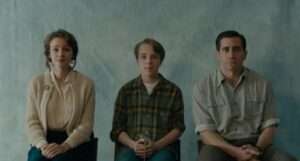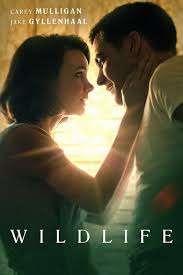
Paul Dano’s Wildlife (2018) is a quiet yet deeply affecting film that explores the disintegration of a family through the eyes of a teenage boy. Adapted from Richard Ford’s novel of the same name, the film marks Dano’s directorial debut and showcases his skill in crafting an emotionally restrained yet devastating narrative. Starring Carey Mulligan, Jake Gyllenhaal, and Ed Oxenbould, Wildlife is a poignant meditation on familial breakdown, individual desires, and the helplessness of witnessing one’s world unravel.
Plot Overview

Set in 1960s Montana, the film follows Joe Brinson (Ed Oxenbould), a 14-year-old boy whose seemingly stable life is upended when his father, Jerry (Jake Gyllenhaal), loses his job and decides to leave home to fight wildfires. Left alone with his mother, Jeanette (Carey Mulligan), Joe watches as she transforms from a supportive wife into a woman desperate for personal fulfillment. Her growing relationship with an older, wealthier man, Warren Miller (Bill Camp), forces Joe to confront uncomfortable truths about his parents and the nature of adulthood.
Performances and Character Depth
Carey Mulligan delivers a career-defining performance as Jeanette, capturing her descent into restlessness and infidelity with remarkable nuance. She portrays a woman both trapped by societal expectations and yearning for something more, yet her decisions, though understandable, are heartbreaking to watch. Her transformation from a doting mother to a figure of ambiguity and frustration is masterfully executed.
Jake Gyllenhaal, though appearing less than expected, makes a strong impression as Jerry. His portrayal of a man whose pride and recklessness lead him to abandon his family is both tragic and infuriating. He is a man unable to face failure and unwilling to adapt, making his departure both inevitable and devastating.
Ed Oxenbould’s performance as Joe is the film’s emotional anchor. He embodies quiet resilience and internalized pain, capturing the confusion and sadness of a child forced to grow up too soon. His restrained acting perfectly suits the film’s tone, making his role all the more affecting.
Direction and Cinematography

Paul Dano’s direction is subtle and unintrusive, allowing the story’s emotional weight to unfold naturally. He employs a restrained visual style, using static shots and slow pans that emphasize the film’s melancholic atmosphere. Cinematographer Diego García beautifully captures the vast, empty Montana landscapes, mirroring the isolation and emotional distance between the characters.
The film’s color palette of muted earth tones further enhances its somber mood, and the careful framing often places Joe at the center of his parents’ unraveling relationship, visually reinforcing his role as both an observer and an unwilling participant in their conflict.
Themes and Emotional Impact

At its core, Wildlife is a coming-of-age story, but it is also a profound exploration of disappointment and self-discovery. The film delves into themes of abandonment, personal ambition, and the fragile nature of family. Jeanette’s arc challenges traditional gender roles, as she refuses to be a passive housewife and instead seeks her own path, regardless of the moral implications.
The film’s slow pacing and minimalistic dialogue may not appeal to all audiences, but its emotional depth and realism make it a compelling watch. There is an aching honesty in the way it portrays family dynamics—nothing is overly dramatized, yet every small moment feels weighty and significant.
Final Thoughts
Wildlife is a deeply affecting film that lingers in the mind long after the credits roll. Paul Dano’s directorial debut is an impressive achievement, showcasing a keen understanding of human emotions and relationships. With stunning performances, particularly from Carey Mulligan, and a restrained yet powerful narrative, the film offers a heartbreaking yet beautiful meditation on the complexities of family and identity.
While its slow pacing and quiet storytelling might not suit all viewers, those who appreciate character-driven dramas will find Wildlife to be a rewarding and thought-provoking experience. It is a film that does not offer easy answers, but instead leaves audiences with a lingering sense of melancholy and a deep appreciation for the delicate balance of love and disappointment that defines family life.





